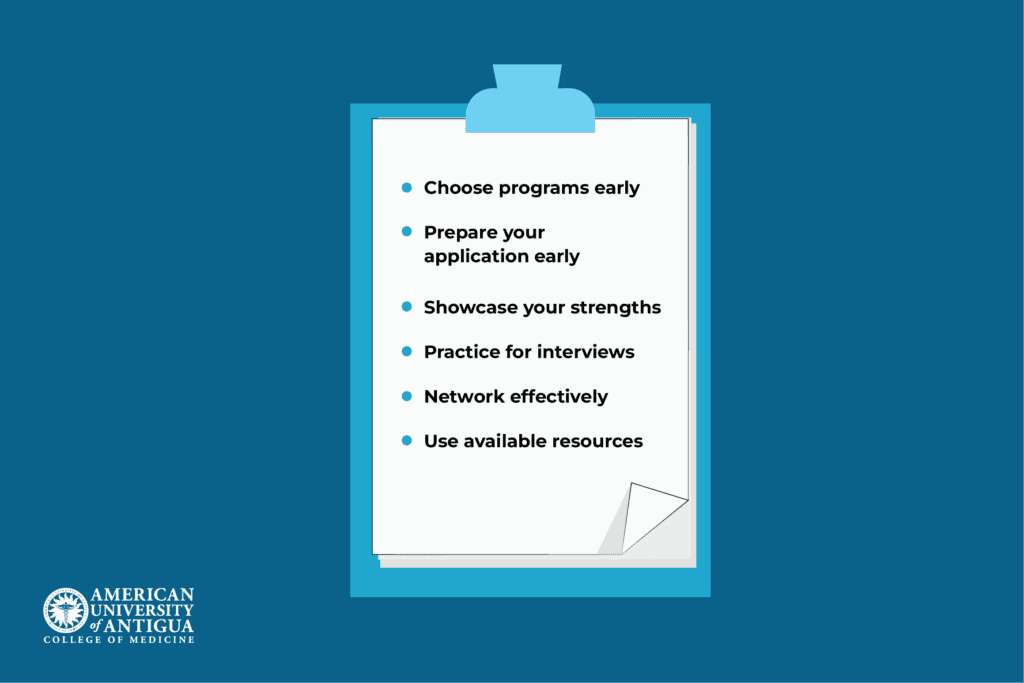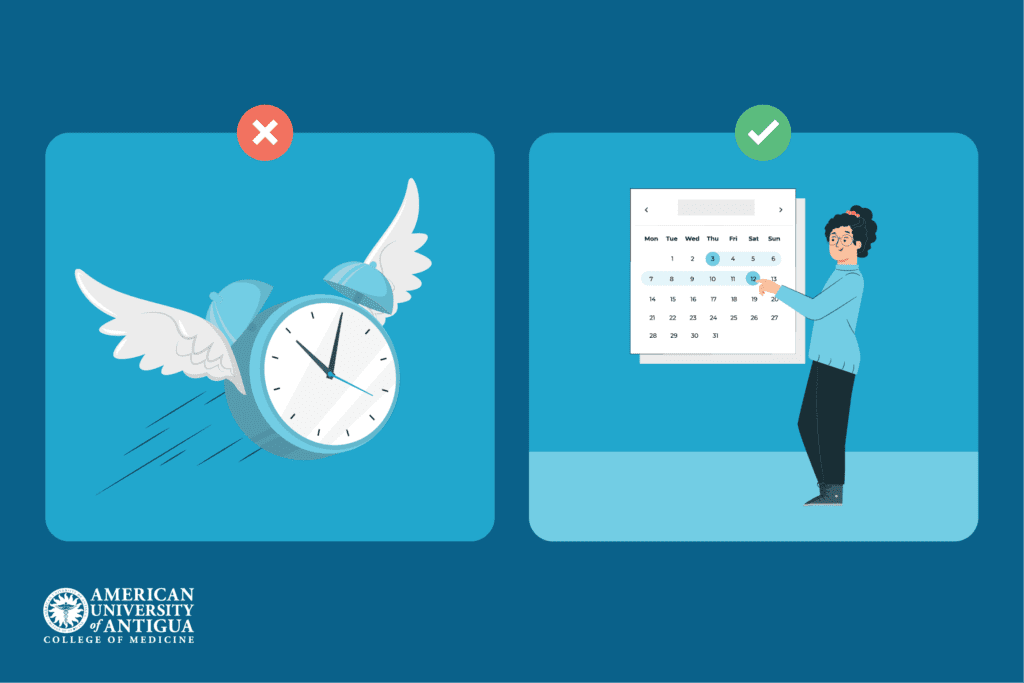How to Get Into Residency by Mastering the Essentials
You can master residency applications by starting early, researching programs, tailoring materials, meeting deadlines, and showcasing alignment, communication, leadership, and adaptability.
Applying to residency programs is one of the most critical steps in a medical career, but it’s also highly competitive and challenging. For many students, navigating the process can feel overwhelming, especially with so much at stake.
✅ Request information on AUA's MD program TODAY!
YOUR PATH TO SUCCESS BEGINS HERE
This guide is designed to help you understand how to get into residency, as it covers what residency programs are looking for, common mistakes to avoid, and tips for strengthening your application.
Whether you’re preparing for your first match attempt or regrouping after a setback, these insights and strategies will empower you to confidently take the next step in your journey toward becoming a practicing physician.
Key Factors Residency Programs Look for
Residency programs seek applicants with strong academic performance, robust clinical experience, and standout personal qualities like leadership and communication skills.
Exceptional letters of recommendation from trusted mentors and a clear passion for the specialty can also set candidates apart. The ultimate goal is to appear as a well-rounded applicant who best aligns with program values.
Strong exam scores
Residency programs place significant weight on exam scores, particularly USMLE Step 1 and Step 2 CK. These scores demonstrate your medical knowledge and ability to handle the academic demands of residency.
High scores can make your application stand out, especially for competitive specialties. If your scores are lower, focus on improving other areas, like clinical experience or research, to strengthen your overall candidacy. While important, scores are just one part of your application, so don’t let them define your entire journey.
Solid GPA
A strong GPA reflects consistent academic performance throughout medical school, showing programs that you’re dedicated and capable of excelling in rigorous studies. While a high GPA can boost your application, it’s often viewed alongside other factors like clinical skills and extracurriculars.
If your GPA isn’t outstanding, highlight your strengths in hands-on experience, research, or leadership roles to show you’re a well-rounded candidate.
Letters of recommendation
Letters of recommendation are a key part of your residency application. Strong letters from respected mentors who know you well can highlight your clinical skills, work ethic, and personal qualities.
Programs value specific examples of your strengths, such as teamwork, problem-solving, and dedication to patient care. Choose recommenders who can genuinely speak to your abilities and align with the specialty you’re pursuing.
Clinical experience
Another factor that weighs in is your clinical experience. This demonstrates your medical abilities as well as your dedication to the field. Programs value applicants who’ve worked closely with diverse patient populations, handled complex cases, and received positive feedback from supervisors.
Strong clinical experience also allows you to build relationships with mentors who can provide glowing recommendations, further strengthening your application.
Personal statement and MSPE
Your personal statement is your chance to tell your story—why you chose medicine, your passion for the specialty, and what makes you unique. A compelling statement can leave a lasting impression, especially if it’s personal, well-written, and highlights your strengths and goals. Be genuine and concise while reflecting on experiences that shaped your journey.
Additionally, pay attention to the Medical Student Performance Evaluation (MSPE) as it provides a detailed overview of your medical school performance.
Fit for the program structure
Residency programs value candidates who align with their mission, values, and training style. Demonstrating your fit means understanding the program’s focus—whether it’s research, community service, or clinical excellence—and tailoring your application accordingly.
Highlight experiences and goals that resonate with their structure, such as thriving in high-volume settings or excelling in teamwork-driven environments. A strong fit reassures programs that you’ll adapt well and contribute positively to their team.
Personal qualities
Residency programs look for candidates with standout personal qualities, such as communication skills, empathy, resilience, and teamwork. These traits are essential for building strong relationships with patients and colleagues.
Highlighting leadership roles, problem-solving abilities, and a commitment to lifelong learning can make you memorable. Programs value residents who demonstrate professionalism, adaptability, and a passion for growth, as these qualities contribute to success in the challenging environment of residency.
Tips and Tricks on How to Get Into Residency

Improving your chances of matching and being competitive for residency requires preparation, strategy, and focus. Here are some key tips:
- Research residency programs that align with your strengths and interests. Focus on those where you meet the criteria to maximize your chances.
- Start drafting your personal statement, gathering letters of recommendation, and updating your CV well before deadlines.
- Emphasize your unique qualities, like leadership, clinical skills, or research experience, that make you a valuable candidate.
- Prepare answers to common residency questions and practice with mentors or peers to build confidence. Strong residency interviews can leave a lasting impression.
- Attend specialty conferences, connect with faculty, and seek mentorship to build relationships with those in your field.
- Tools like the ERAS application guide or mock interview workshops can provide valuable support.
Strategic preparation and proactive networking can set you apart and help you stand out in the competitive residency match process.
Applying to Residency
Let’s now take a look at the step-by-step process of applying for residency placements. From identifying your niche to finalizing your residency application, it’s important to enter the process fully prepared and ensure no mistakes are made.
Identify your desired speciality
Reflect on your interests, strengths, and long-term goals to choose a specialty that suits you. Research the competitiveness of the field and the qualifications needed to align your strategy.
Prepare for exams
Focus on excelling in the USMLE or COMLEX exams, as scores play a key role in your application. Plan study schedules early and aim for strong results on Step 1 and Step 2 CK.
Complete the ERAS application
Use the Electronic Residency Application Service (ERAS) to organize and submit your documents, including your personal statement, letters of recommendation, CV, and transcripts. This platform is crucial for most residency applications.
Finalize your application
Proofread all materials thoroughly and ensure everything is polished. Confirm letters of recommendation are uploaded and tailored for your desired specialty.
Prepare for interviews
Practice with mock interviews, research programs in depth, and develop clear, concise answers to common questions. Highlight experiences that demonstrate your fit for each program.
Submit your rank order list
After interviews, rank programs in the National Resident Matching Program (NRMP) based on your preferences. Be strategic but honest in your rankings.
Wait for the match
Match Day is when the residency placement results are revealed. Stay positive, and remember that SOAP (Supplemental Offer and Acceptance Program) is available if you don’t match initially. SOAP is a process that helps unmatched applicants secure remaining residency positions by submitting applications and participating in interviews for unfilled spots.
Avoid These Common Mistakes

Applying to residency programs is a competitive and often stressful process, and making mistakes along the way can hurt your chances of matching. Many applicants overlook important details, which can lead to missed opportunities or a weaker application.
Some of the most common mistakes you should avoid are:
Submitting incomplete applications
Missing documents like letters of recommendation, personal statements, or transcripts can hurt your chances.
Advice: Double-check that all materials are submitted through ERAS well before the deadline. Set reminders to ensure everything is uploaded.
Failing to tailor personal statements
Generic personal statements don’t stand out. Each program wants to know why you’re specifically interested in their residency.
Advice: Personalize your statement for each program, highlighting how your goals align with their mission and what makes you a great fit.
Overlooking important deadlines
Missing deadlines can lead to missed opportunities, such as interviews or early application rounds.
Advice: Stay organized with a detailed timeline and checklist of important dates. Consider using a calendar to track each step of the process.
Not being prepared for interviews
Being unprepared can make you appear disinterested or unqualified.
Advice: Practice common interview questions with mentors, research each program thoroughly, and have specific examples ready to showcase your skills.
By avoiding these mistakes and staying organized, you can strengthen your application and increase your chances of matching into a residency program.
Conclusion
When it comes to applying for residency programs, preparation is key—start early to meet deadlines, practice interviews, and build strong relationships for recommendations. Paying close attention to each step, from identifying programs to submitting rank lists, ensures a polished and competitive application. Early planning and dedication are essential to increasing your chances of successfully matching into a residency program.
Frequently Asked Questions (FAQs):
Do I get paid during residency?
Yes, residents earn a salary, but it’s typically modest compared to the hours worked and the responsibilities involved.
Is residency or medical school harder?
Residency is generally harder due to long hours, higher responsibility, and real-world patient care demands, though medical school can be more academically intense.
✅ Request information on AUA's MD program TODAY!
YOUR PATH TO SUCCESS BEGINS HERE
✅ Request information on AUA's MD program TODAY!